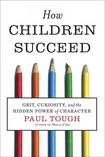
The second half of the book strays a bit from the topic of grit in general and focuses on some specific examples, including the chess team from I.S. 318 in New York (featured in the documentary Brooklyn Castle). While the stories are impressive, they seem more anecdotal than research-based; I would have preferred to read more analysis of the metrics used to define "traumatic experiences" and how that affects brain chemistry.
One of the specific things he mentions in the first half that intrigued me was the idea of the human stress-response system likened to firefighters. When people react to stressers (lack of food, neighborhood gang violence, etc), their system goes into superdrive, and "simply respond quickly with every tool they need. This might be the right strategy for saving lives in fires, but it can also result in a dozen trucks pulling up to put out a single smoldering trash can - or worse, responding to a false alarm" (p. 14). This constant waste of energy and misuse of bodily resources becomes draining on the brain of a human and results in less cognitive ability overall.
That being said, one of the most important things Trough brings up in his book is the idea that resiliency and grit - two factors highly correlated with later success - are more malleable than IQ. "Pure IQ is stubbornly resistant to improvement after about age eight. But executive functions and the ability to handles stress and manage strong emotions can be improved, sometimes dramatically, well into adolescence and even adulthood" (p. 48). If this is true, then we need to refocus our energies in low-income high schools across the country to ensure they understand and implement some of this research.
Over the past year I have been thinking more and more about the idea of a useful homeroom/advisory period that stretches beyond the 12-20 minute timing usually provided in Philadelphia schools. Instead, have a 45 minute class period twice a week to focus on issues like grit, resiliency, listening to student needs, and more. Perhaps this would create better outcomes for our students in the future.


 RSS Feed
RSS Feed
